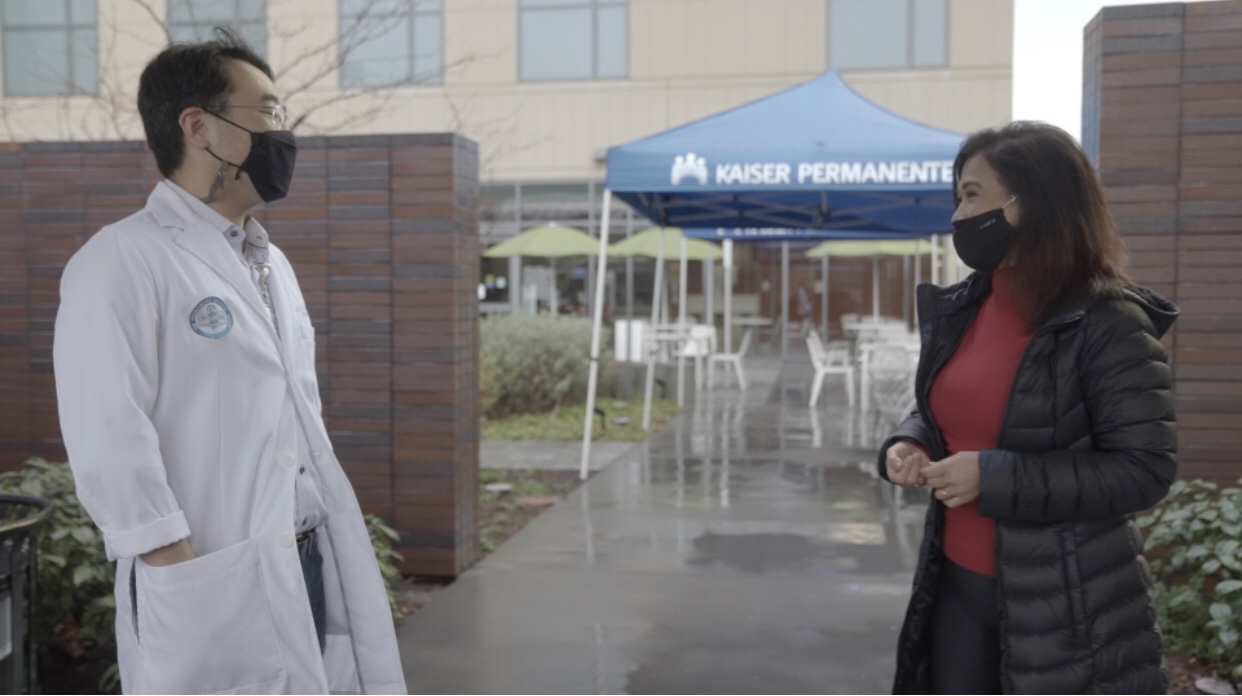
THE doctors, nurses, and caregivers who are fighting on the frontlines of the coronavirus pandemic are our modern-day heroes. They work long hours and are exposed to the COVID-19 virus on so many levels. What happens when these heroes get infected by the virus? What happens when the doctor becomes the patient?
Let me share with you my interview with a colleague of my husband at Kaiser Permanente Medical Center in Redwood City, California.
Dr. Eric Kwon is an Asian American urologist and is among the frontliners who have no choice but to continue serving and providing care to his patients despite the threat of COVID-19. In March, when the coronavirus was declared a pandemic, and just when the whole world was still learning more about this new virus, Dr. Kwon was infected by COVID-19. The doctor became the patient.
Dr. Kwon: It was late March. We were learning how to put on and take off PPE, what to do in case someone had symptoms. And it was just it was actually very confusing. There was a lot of change, a lot of information. A lot of uncertainty. And a lot of change, all at once.
And then one Saturday morning, I woke up and I felt I felt a little sick. A little runny nose, a slight cough headache. But mostly I was tired. That was [an] overwhelming feeling that I had throughout the entire disease process. So, took some Tylenol took a nap, what I thought would be a nap and eight hours later, I woke up. And to my surprise, the entire day had passed. And, but I felt better. So I didn’t think much of it. So I went about my evening.
The next day, Sunday, no problem, no symptoms. I thought, ‘Oh this must have been just a hard week at work, and I was just tired.’ You know sometimes when you’re really tired, you can feel sick.
That Monday, I went to work. I was okay. That next Tuesday, I went to work, and around nine in the morning when our team huddled to talk about the day, I remember having a headache. And I said, ‘Oh, that’s funny, you know, I got a good night’s rest, took an Advil, got through my morning.’
And then right around noon, when we’re finished with the morning patients, my partner came over to me and said, ‘Hey let’s go get lunch.’ I remember putting on my white coat, and as I put my arms into the sleeves, I could feel it was like sandpaper. My body just ached and I felt a slight fever.
…My whole body was just very achy [and at] lunch, [I] didn’t think much of it…And I was thinking to myself, I wasn’t thinking I have coronavirus. I was just thinking: ‘Gosh, I hope I’m not getting sick with the flu.’ Because the very next day, Wednesday, was the start of spring break for my kids, and I was supposed to be off for two weeks. And the trip that we had planned was already canceled. So we were thinking, what else are we going to do, we’re going to, maybe, you know, do something local, you know, spend some time with the family.
And then that night, I got home. And that’s when it really got serious with fevers, chills, more body aches, headache, joint pains, but really just feeling terribly tired. I just wanted to lay down, I could not get out of bed. And so that was the beginning of it.
Q: How do you think you got infected?
Dr. Kwon: The next morning I get up, I’m thinking I’m looking back [at] what happened. At that time, we were not wearing masks…So, we did not understand that this was an airborne disease. So we were talking about six feet social distance. We were talking about hand washing and cleaning surfaces. But really, in hindsight, we now know that this is an airborne virus. So, if you’re indoors, even if you’re six feet apart — it doesn’t really matter. Masks can help. It’s not everything. But you really need to provide protection for your airway.
So before I became sick, even though we knew this virus was raging, we did not even in the hospital, and in the clinic here at the Medical Center, we did not have a mask policy. In fact, we were worried about using up the limited supply of masks that we had. So we were very much in the mode of preserving masks and PPE rather than just making sure that everyone was using them everywhere.
And of course, depending on the advisory coming from [the] CDC and the health officials. But the fact is we’re just learning more about this on COVID-19… In my personal opinion, I think probably a lot of people would agree that the way we responded, our initial response to this virus was a complete public health failure.
Q: How did this experience change you?
Dr. Kwon: You know, I’m middle-aged. Before this happened. I considered myself to be young and healthy. Now, I know that I’m old. And I know that because I realized that I am no longer invincible.
When you’re young, when you’re healthy, you don’t think that something bad like this can happen to you.
And as a physician, maybe as health care workers, we might have this little voice in our head, that says, I’m one of the good guys. Right. So, in a moral universe where there’s maybe you believe in karma. If you do good, good will come to you, if you work hard, you will be rewarded. If you do the right thing. Maybe that will somehow protect you from being in harm’s way. All of those myths evaporated in a heartbeat — being young being healthy, never, ever hospitalized, don’t really go to the doctor ever, and wasn’t taking any medications.
Occasionally, you know, go in for vaccination for work, get the flu vaccine once a year. But other than that, my interaction with the medical world actually as a patient was quite minimal. And so, I had this thinking that it would not affect me at all — what a mistake that was. And now on the other side of having gone through a relatively severe bout of COVID, being in the ICU for several days, being sick and symptomatic for a couple of months. And now having some residual long haul symptoms that I’m still recovering from.
Q: How was it like being a patient? What insights did you learn from this health crisis in your own life?
Dr. Kwon: It’s been very humbling. And the thing that I think the way that I really changed is my perspective on the people, the people that we depend on that. They’re always there quietly doing their work. And they’re in the background…when you really need them.
These are exceptional people that do the work every single day with hardly any recognition. They’re not getting awards. This is not Hollywood. These are real life, everyday heroes. And the people who are most impactful for me, who have been the most impactful have been the nurses. [“Many of the nurses who take care of COVID-19 patients in the hospital are Filipinos,” added Dr. Rene Relos.]
They are the ones that are literally on the frontlines putting themselves at risk, more, more than anybody else really and doing the hard work, providing the care. So, before all of this, of course, I am friends with the nurses and I know them, some of them personally, mostly in the operating room, where we have teams and we work together.
But after being a patient and directly receiving that care that that human touch, literally. You know I was quarantined for a total of five weeks. And during that five weeks, the only people that ever touched me were nurses, and that warm hand on my arm was reassuring.
The reassuring words, the medicine they brought, the ice packs that they put around me. When my body felt like it was on fire. Those are the people. They are my heroes, and I appreciate them way more than I ever did.
Our mothers, our fathers in this war against the coronavirus…It’s really important to understand that, because there are only so many of them.
Our nurses have gotten sick, particularly in the spring, when PPE was in such short supply…You know nobody likes to admit this but the United States, our healthcare system, we just were not prepared for, for many reasons. Supply chain being one of them. We just didn’t have what we needed. Let’s just face the facts.
So we were making do with what we have reusing and N-95 masks. We’re still reusing them. So, unfortunately, a lot has not changed. But at least we are. We’ve learned. But it’s not like we have a whole army of nurses that we can just call upon to fill in. We have a limited workforce. You know they’re working very hard, under extremely stressful situations.
And we have to protect them. We have to treat them as a valuable resource and a limited resource. And the way we do that is with our own behavior [and] to protect each other.
HAPPY NEW YEAR!








